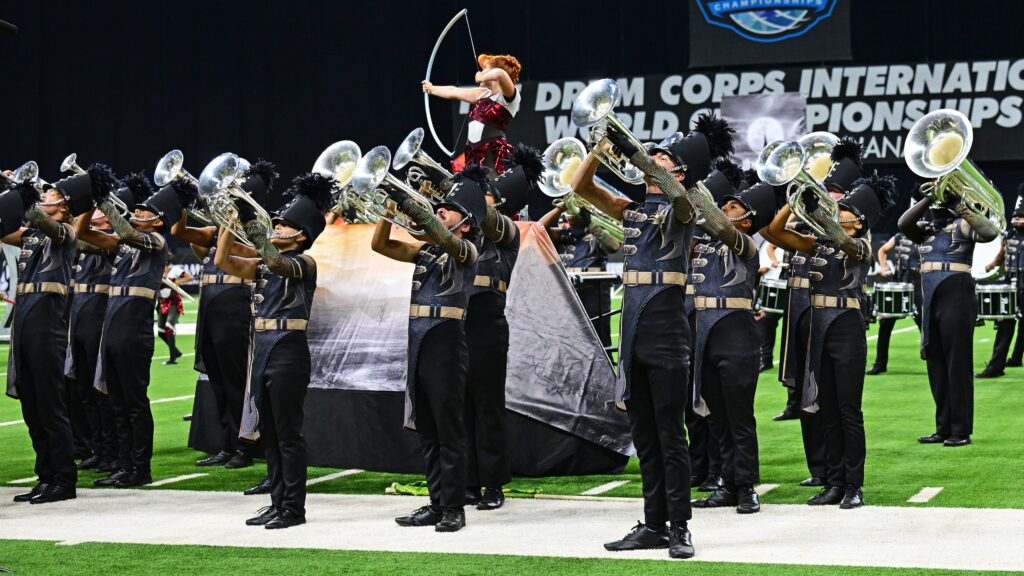
Other female DCI snare players haven’t run into problems overcoming stereotypes either. Erin Rigelman, the Bluecoats’ snare line leader (and that corps’ percussion section leader), says she gets asked about overcoming snare drumming stereotypes quite a bit. “Honestly, for me, it is not difficult to be a female snare player. I love what I do. I was lucky to have had a female teacher/role model and to have marched in drum lines with other women.”
“I’ve heard about all the stereotypes but I have honestly never experienced
them,” said Southwind snare player Mandie Meek. “It was never difficult for me to be a female snare drummer. I was never treated any differently than any other member of the line. In fact, I’ve never gotten anything but a positive reaction that I’m a girl drummer.
All those stereotypes about people more often than not aren’t true, and they really make me laugh, sometimes,” Meek said.
However, Jennifer Lynne Renwick, who marches snare with Southwind, said it can sometimes be difficult for women to perform as a snare player. “Sometimes it is difficult because because of the stereotypes. People almost expect you to suck, which is why I work so hard to not suck,” Renwick said. “There is definitely a stereotype out there that “Girls can’t drum.” This is one of the reasons why I strive to reach such a high level of drumming. I use that stereotype as motivation to prove those who think that wrong. I want girls to see me in the audience and think, “Well if she can do, it I can.” If I inspire even one girl this summer to want to go against the grain and become an awesome snare drummer, then I’ve achieved my purpose as a female snare drummer.
Rigelman attributes part of her success as a snare drummer to the Bluecoats’ staff. “When I decided that I wanted to march with the Bluecoats, I knew I was going to have to work extremely hard in order to get a spot because it’s very competitive and requires a lot of dedication and preparation. The staff at Bluecoats has never treated me any differently than anyone else. Perhaps I’m lucky to have had such wonderful teachers who are open-minded, but I feel that if I don’t place the stereotype in the way of my dreams, no one else can, either,” Rigelman said.
Meanwhile, snare player Jean Kaluza of the Kiwanis Kavaliers finds it much harder to overcome other stereotypes. “I find being 5 feet tall a much harder obstacle,” Kaluza said.
Stults said that she can’t recall any telling anecdotes about her status as a woman snare player. “I can’t think of a moment that encapsulates my experience as a female snare drummer because there are hardly any experiences that I have with drumming that differ from the guy standing next to me. The only difference I can think of is that people probably give me more attention just because I am a girl,” Stults said.
All interviewed female snare players stress the importance of practice in their roles as snare drummers. Rigelman said, “I practice a few hours each day, depending on my schedule with class and meetings. Trying to balance participation in three separate drum lines (the University of Michigan, Rhythm X (WGI) and the Bluecoats) can get overwhelming, but it is also very helpful. Each line has something different to offer, and constantly learning new music and drumming in a line keeps me on my toes.”
Southwind’s Renwick stresses the importance of practice, despite the time constraints of being in school (she attends the University of Minnesota). “Finding practice time is hard being a full time student who has to work to pay her own tuition, rent, and bills. I try to practice as much as possible even if I only have a few minutes. I’ve found that a good time to drum is when you need a break from studying. It releases some of the stress!” Renwick said.
Stults echoes the time management aspect of practicing while in school. “Now I’m in college and I’ve found practice time harder to find. Classes, hockey and just living on my own has cut into my practicing. Now that I have more free time I think I’ll be able to get back into the habit of practicing hard every day,” Stults said.
Kaluza, who goes to Lakeland Community College, says her practice schedul varies in the winter months. “I try to average about an hour to two hours a day,” Kaluza said.
Rigelman also advises aspiring snare players to sweat though it. “Work hard for what you want. In life, everyone will encounter numerous stereotypes — the important thing is to not let them dictate who you are or what you can accomplish. If you have a dream, if you have goals, go after them. Anyone can achieve their goals if they really want to. It’s a matter of working hard and pushing yourself outside your comfort zone. You may encounter people along the way that don’t believe in you — the same goes for anyone — but make sure you never stop believing in yourself,” Rigelman said.
Although Kaluza finds overcoming height issues a bigger deal than gender issues, she did note that before one performance, a little girl asked her a question that encapsulated her experiences as a woman snare player. “During a warm-up before a show, I had a little girl come up to me and ask, “How much do I have to practice to be like you?”
Renwick, meanwhile, sees her role as a female snare player equating to fields beyond DCI. “This can also be applied to more than drumming. It’s also about women succeeding as engineers or CEOs or any other male-dominated field of work. This is just one way that I like to demonstrate that women are capable,” Renwick said.
Meek lists a set of attributes future female snare drummers should adhere to. “Be observant, ask questions, get good instruction, be positive and practice! It’s not as unattainable as it seems,” Meek said.
Stults, meanwhile, says that women snare players should not expect to receive any special treatment in their status as snare drummers. “If you’re one of those girls who thinks they should get some sort of special treatment, you’re wrong.”





